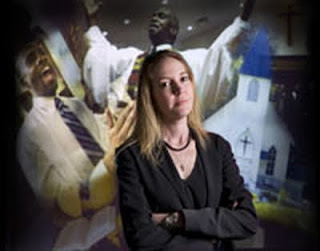COLLEGE PARK, Md. -- Doctors have long struggled to convince African American men to get informed about prostate cancer screenings, though this population has a disproportionately high mortality rate from the disease. Now a team of Maryland researchers will study the effectiveness of encouraging discussions about screening through a trusted authority in the black community: the church.
The American Cancer Society has awarded $1.8 million to Cheryl Holt, an associate professor in the university's School of Public Health, to develop and evaluate "spiritually themed health interventions" specific to prostate cancer for men attending 20 predominately African American churches in Prince George's County, Md.
Last year, there were 192,280 reported cases of prostate cancer in the United States, and 27,360 deaths, with African American men showing a mortality rate twice as high as other racial or ethnic groups.
Holt, a social psychologist and an expert in health communication, says that peer-based health education in a church setting is "culturally appropriate," and churches are already recognized as a social network for African American men. "The gentlemen are comfortable -- it is an all-male session, and one of their peers is providing the information," Holt explains.
The setting can also allow information to be framed in a spiritual way that emphasizes already-accepted church principles regarding body, mind and spirit, or the notion of being healthy in a holistic way. The key, Holt says, is to capture the men's interest and give them enough data to decide whether prostate cancer screening is right for them.
The American Cancer Society recently released new recommendations stating that all men over the age of 50 should discuss with their doctor the need for an annual screening.
"If you can access and educate people who carry weight and carry influence in the African American community, hopefully they can then go out and explain to people the importance of getting this done," says Michael Naslund, M.D., head of urology and director of the Maryland Prostate Center at the University of Maryland Medical Center in Baltimore.
Naslund, who is also a professor of surgery at the University of Maryland School of Medicine, expects to provide medical expertise during the study. He says it is important to drive home that prostate cancer is curable if caught early.
The first year of the Maryland study will be spent developing the curriculum and materials that the community health advisers will use. Input will come from an advisory panel of local pastors and prostate cancer survivors.
Once the curriculum is established, the community health advisers may start out talking about basic issues, Holt says, perhaps talking about something as simple as leading a healthy lifestyle. The discussions will then progress, with the adviser leading a conversation that may include such questions as, "What is cancer?" or, "What is the prostate? Where is it? What does it do?"
"We also think we'll see the health advisers identify and bring in gentlemen who will give their testimony -- it is a common thing in the church for folks to give their testimony," says Holt, who conducted similar church-based studies in Alabama two years ago that the current project is based upon.
In the context of cancer, it may be a gentleman who is a survivor. "He can give his testimony on how his cancer was found, how it was found early, it was treated, and how he is here today because he was proactive," Holt says.
Later sessions may talk about what to do following a diagnosis of prostate cancer, including possible treatment options. The health advisers will not offer any medical opinions, but will be trained to provide links to resources, such as where men can get free screening or treatment if they do not have insurance.
Holt says that it is important to recognize that the project has a lot of sustainability built into it. For example, after the prostate-screening curriculum is taught to community health advisers, these same people can then be taught another targeted intervention -- diabetes, perhaps.
"We expect to teach them the core knowledge and the skills to communicate," Holt says. "All they have to do is pick up a new curriculum and integrate it into their health ministry or health group."
In addition to Holt and Naslund, the project includes several other investigators, a statistician and other support staff from the university's School of Public Health and Department of Anthropology. Two community-based organizations will provide partnership and staffing: Community Ministry of Prince George's County and Access to Holistic and Productive Living Institute Inc. The project will be operated in conjunction with the Seat Pleasant/University of Maryland Health Partnership
Media Contact Information: Associate Professor Cheryl Holt, 301-405-6659.
Dr. Michael Naslund can be contacted throughEllen Beth Levitt, director, Public Affairs & Media Relations, University of Maryland Medical Center, 410-328-8919.
For Immediate Release April 7, 2010 Contacts: David Ottalini, 301 405 4076 or dottalin@umd.edu
















No comments:
Post a Comment